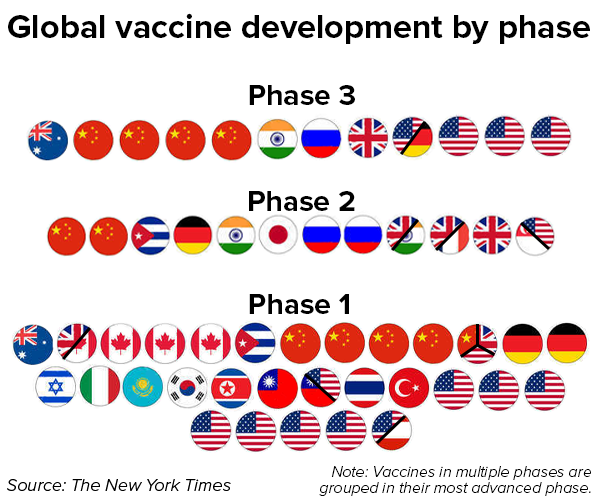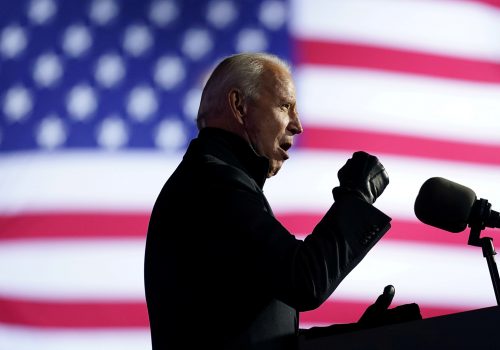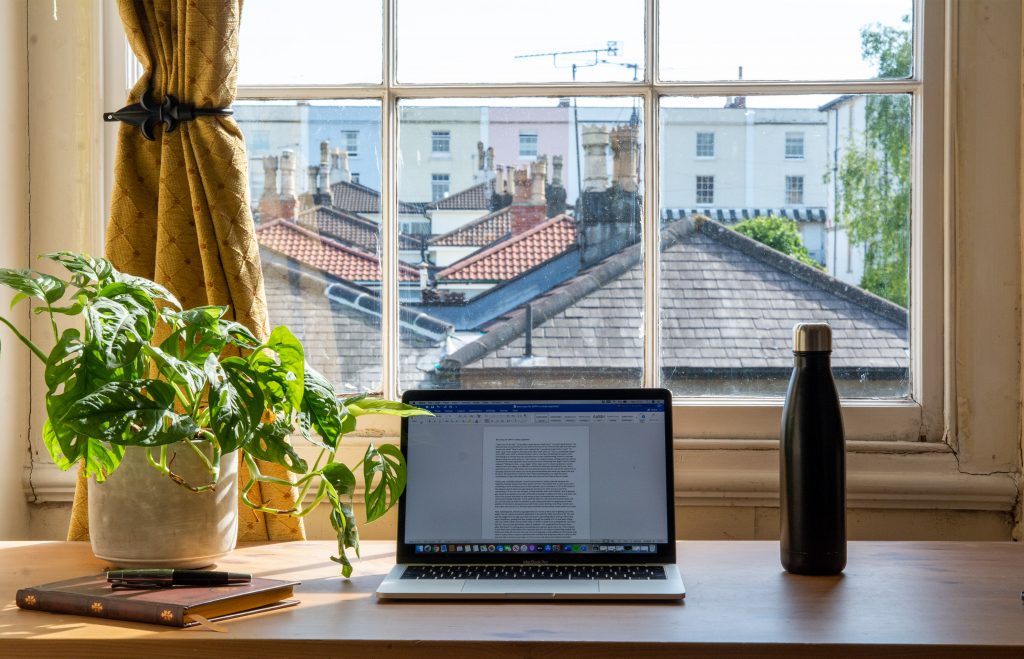The future is here: A guide to the post-COVID world 11/12/2020
Welcome to your guide to where the world is headed during the pandemic era and beyond. Each week, we’ll bring you the latest and most significant expert insights and international news about how coronavirus is reshaping international affairs. To stay updated each week, sign up to the newsletter here.
Let’s take a spin around the globe, in seven minutes or less.
In top stories this week:
- It’s not just Europe: New pandemic restrictions are cropping up again around the world.
- The “darkest” days lie ahead for the United States’ COVID-19 wave as winter nears.
- In China, Singles’ Day sends signals about the resilience of consumerism.
- But first…
The big story
This week’s key theme: The global race for a vaccine is getting crowded—and competitive
As people grow restless amid new measures to contain coronavirus, the latest vaccine news has been a source of comfort and excitement: Pfizer and BioNTech have announced that their COVID-19 vaccine is more than 90-percent effective.
But temper that excitement, please. “[I]t will take multiple vaccine candidates to get enough of the global population vaccinated to end the threat of COVID-19,” Bloomberg’s Max Nisen reminds us.
Subscribe to The future is here: A guide to the post-COVID world
Sign up for a weekly roundup of top expert insights and international news about how coronavirus is reshaping international affairs.

Mapping the field
Pfizer and BioNTech have company. In August, Russia became the first country in the world to register and approve a COVID-19 vaccine. And on November 11, Russia’s sovereign-wealth fund said the country’s Sputnik V vaccine is 92-percent effective, Reuters reports. But here there’s even more cause for skepticism: Little is known about the trial’s design and protocols.
Nevertheless, Russia is exercising soft power, analysts say, by selling its vaccine to countries including Brazil, India, Mexico, and Egypt. Sputnik V is named after the satellite from Soviet days that triggered the space race, “a nod to the project’s geopolitical importance for Russian President Vladimir Putin,” Reuters notes.
China, meanwhile, is working on developing vaccines and promising to deliver them to the developing world as “part of a charm offensive to soothe anger over [Beijing’s] early mishandling of the outbreak,” the Financial Times reports. But the charm has run out in Brazil, where the country’s health regulator halted final-stage trials of a vaccine made in China—raising questions, the newspaper says, about whether President Jair Bolsonaro put pressure on the regulator. Bolsonaro has been speaking out against the vaccine, saying that Brazilians shouldn’t be “guinea pigs.”
While the United States, the United Kingdom, Japan, and Canada have signed deals big enough to vaccinate their entire populations, a joint worldwide effort to get a vaccine to more than 150 countries has secured just 700 million doses, The Washington Post reports. And while the Pfizer and BioNTech vaccine has made progress, the companies haven’t struck any deals to supply it to developing countries. The fact that the shot needs to be stored at very low temperatures will also make it challenging to distribute around the world, according to the Post.
The bottom line: Don’t expect the world’s entire population to be immunized against COVID-19 until 2024, the Post cites Adar Poonawalla—whose company, Serum Institute of India, makes more vaccines than any other company on earth—as saying. India is likely to play a key role in supplying the developing world, which is starting at a “distinct disadvantage,” the newspaper adds.
The big picture
This week’s key theme, visualized: The geopolitics of vaccine development
Vaccine development is at different stages in different countries, which breeds competition but also multiple candidates that could help increase access to eventual vaccines.

The world in brief
Insights from across the planet, in ten bullets or fewer
- The European Commission has proposed reforming public-health rules, giving the European Union powers to declare a health emergency and stress-test national governments’ pandemic plans, Reuters reports. The proposal for more coordination across the EU follows an often-uncoordinated pandemic response by the bloc’s twenty-seven member states, who competed at the beginning of the pandemic for vital medical supplies.
- Experts are sounding alarms about what the winter will bring, as US infections increase. “US prepares for worst four months of the pandemic as it stares down the ‘darkest’ days yet” runs a CNBC headline. Epidemiologists, scientists, and public-health officials are warning that hospitals across the United States, which has recorded more than 100,000 new cases per day over the past ten days, could soon be overwhelmed, the BBC reports.
- QUOTE: “We have not even come close to the peak and, as such, our hospitals are now being overrun,” says Dr. Michael Osterholm, a member of President-elect Joe Biden’s COVID-19 task force, CNBC reports. “The next three to four months are going to be, by far, the darkest of the pandemic.”
- With US employment in the balance, training is key. While the US unemployment rate fell to 6.9 percent in October, from 7.9 percent the month before and almost 15 percent in April, that improvement could be fleeting if new COVID-19 waves spur fresh containment measures, Quartz says. Those who are currently working will need to upgrade their skills if the US economy is to carry on growing, Bloomberg cites Federal Reserve Bank of Philadelphia President Patrick Harker as saying.
- It’s not just Europe: Pandemic restrictions are popping up again around the world. Countries including England and Lebanon have imposed national lockdowns, while Germany has implemented a partial lockdown. Officials in Italy sealed off Milan, the country’s business capital, and the surrounding region of Lombardy as hospitals ran out of beds and ambulances waited for hours to drop off COVID-19 patients, The Wall Street Journal reports. Cambodia banned state-organized events in the capital and nearby after people connected to a Hungarian official’s visit tested positive, The Washington Post says.
- The wider economy in Europe is less affected by lockdowns than in the spring, the Financial Times reports, citing alternative and high-frequency data such as truck mileage and restaurant bookings. The region’s services industry has been hit hard, but the data indicates that more people are traveling to work now than in the spring. Factories are still operating too.
- The pandemic’s disruption of the oil market is pushing Gulf countries back to the policy drawing board. Gulf governments fearing a loss in oil revenue are overhauling policies that have turned potential talent and investment away in the past, The Wall Street Journal reports. The United Arab Emirates, for example, has decriminalized unmarried couples living together, while Saudi Arabia has altered a system of labor contracts that bond expatriate workers to their employers, the Journal says.
- OPEC trimmed its forecast for 2020 and 2021 global oil demand after a surge in COVID-19 cases. The group of oil-producing nations made the revision based on recent adjustments to economic outlooks in OECD countries given lockdown or containment measures, while also factoring in the pandemic’s impact on travel, CNBC cited OPEC as saying in its report. And while oil demand seemed to be recovering in the third quarter as lockdowns eased, OPEC is now concerned that the recent fall in oil demand could derail a recovery for some time.
- QUOTE: “COVID-19 has damaged our society and no attempt at sugar-coating changes that fact,” Chris Giles writes in the Financial Times. “Persistent economic scars are likely to limit economic activity and growth for years, reduce living standards and worsen public finances, all creating the need for higher taxes or austerity in the years ahead.”
- Singles’ Day shows that the lockdown-weary are ready to spend. China’s Alibaba clocked over $70 billion in online sales during Singles’ Day, the world’s biggest shopping event, as consumers exhausted by the pandemic let go of their pocketbooks, Reuters reports. The shopping bonanza, spread over four days this year, is so enormous that it’s an indicator of China’s economic recovery following the pandemic, the news agency says.
The inside scoop
Insights from the Atlantic Council



